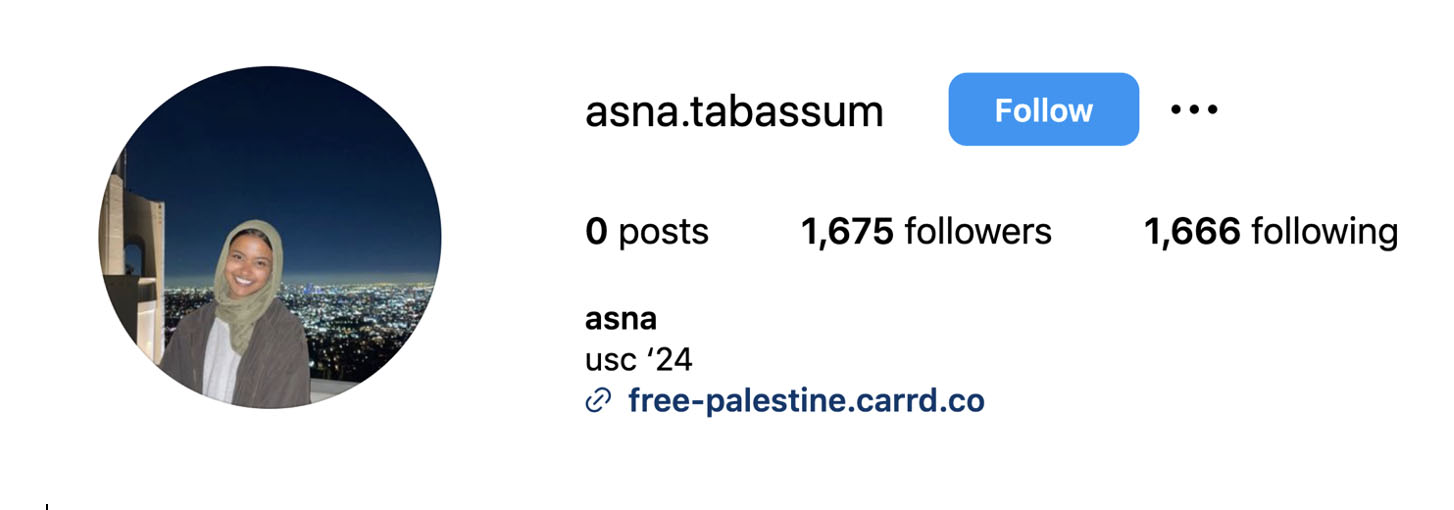 Rattankun Thongbun/Getty Images
Rattankun Thongbun/Getty Images USC announced on April 15 that this year’s valedictorian will not be giving a commencement address after allegations of antisemitism percolated on social media against her.
We Are Tov, which describes itself as an organization of students and alumni aimed at combating antisemitism, posted to Instagram on April 10 that the valedictorian, Asna Tabassum, has a link in her Instagram bio that refers to Zionism as “a racist settler-colonialist ideology that advocates for a Jewish state built on Palestinian land” and that the Zionist founders believed that “the Palestinians needed to be ethnically cleansed from their homes and homeland.” We Are Tov also alleged that the link on Tabassum’s Instagram bio stated that “antisemitism is weaponized against Palestinians and allies who stand up for Palestinian human rights by Zionists as a way to shut down criticism of Israel.”
The link also states: “One Palestinian state would mean complete Palestinian liberation, and the complete abolishment of the state of Israel. This is the only way for justice.”
“Being selected valedictorian is an honor, and we are positive she is academically qualified for the position, but it’s unacceptable that she promotes antisemitic views,” We Are Tov wrote on Instagram. “What will she say at the podium?”
The Instagram account that We Are Tov alleges belongs to Tabassum is private, but as of publication time, the link can still be seen in the account’s bio.
Trojans for Israel posted to social media that they “are deeply disappointed that the University chose to platform a student who would elevate the very voices who target, harass, and exclude Jewish students.”
USC Provost and Senior Vice President for Academic Affairs Andrew Guzman announced in a campus-wide email on April 15, “Over the past several days, discussion relating to the selection of our valedictorian has taken on an alarming tenor. The intensity of feelings, fueled by both social media and the ongoing conflict in the Middle East, has grown to include many voices outside of USC and has escalated to the point of creating substantial risks relating to security and disruption at commencement. We cannot ignore the fact that similar risks have led to harassment and even violence at other campuses.” He added: “After careful consideration, we have decided that our student valedictorian will not deliver a speech at commencement. While this is disappointing, tradition must give way to safety.” Guzman stressed that “this decision has nothing to do with freedom of speech. There is no free-speech entitlement to speak at a commencement. The issue here is how best to maintain campus security and safety, period.”
Guzman went on to explain that the naming of the valedictorian is based on a faculty committee’s recommendations; he vowed to “work with the faculty to reconsider how best to recognize and celebrate the incredible achievements of our most outstanding undergraduate students. Many large universities like USC, for example, have moved away from selecting a single valedictorian from the many who are qualified, in favor of more inclusive processes and traditions.”
Tabassum said in a statement posted on the Council on American-Islamic Relations Los Angeles (CAIR-LA) website, “Although this should have been a time of celebration for my family, friends, professors, and classmates, anti-Muslim and anti-Palestinian voices have subjected me to a campaign of racist hatred because of my uncompromising belief in human rights for all.” She added that while she is “not surprised by those who attempt to propagate hatred. I am surprised that my own university — my home for four years — has abandoned me.”
Tabassum proceeded to claim that when she asked the university what exactly the safety concerns were, she “was told that the University had the resources to take appropriate safety measures for my valedictory speech, but that they would not be doing so since increased security protections is not what the University wants to ‘present as an image.’” This prompted Tabassum to suggest that “there remain serious doubts about whether USC’s decision to revoke my invitation to speak is made solely on the basis of safety.”
“I am a student of history who chose to minor in resistance to genocide, anchored by the Shoah Foundation, and have learned that ordinary people are capable of unspeakable acts of violence when they are taught hate fueled by fear,” Tabassum declared toward the end of her statement. “And due to widespread fear, I was hoping to use my commencement speech to inspire my classmates with a message of hope. By canceling my speech, USC is only caving to fear and rewarding hatred.”
CAIR-LA denounced USC’s decision as “cowardly” and launched a campaign urging USC to rescind their decision to not let Tabassum speak.
In an April 11 statement, Hillel Executive Director Dave Cohn said “USC Hillel is committed to ensuring that our Jewish students can thrive and lead full lives on campus. Every student deserves the opportunity to celebrate their achievements and their promising future with their loved ones on commencement day. We cannot allow hostile or antisemitic views to blemish this long-anticipated experience for a class that has been asked to bear so much during their four years in school.”
End Jew Hatred, which sent a letter urging the university to reconsider its valedictorian decision, said in a statement, “USC wisely acknowledged safety concerns in allowing the speech to go forward, as it is undeniable that the safety of Jewish students has been jeopardized every time antisemitic and anti-Zionist rhetoric has been shared on campus, especially after the October 7th terrorist attacks against Israel. Ms. Tabassum’s speech as valedictorian was anticipated to be harmful to Jewish students and even potentially agitate anti-Jewish activists. #EndJewHatred is grateful that USC recognized the danger posed by Jew-hatred and will not allow Ms. Tabassum to abuse her platform to spread it. We are also encouraged that USC is reviewing its selection policy to make sure this does not happen again in the future. Only through systemic change can we delegitimize Jew-hatred and make it as unacceptable as every other form of racism and bigotry in the college space.”























 More news and opinions than at a Shabbat dinner, right in your inbox.
More news and opinions than at a Shabbat dinner, right in your inbox.